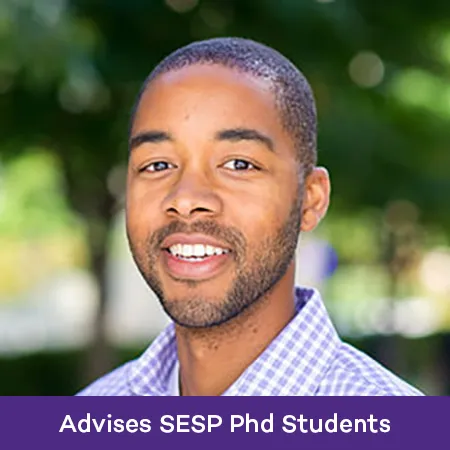Marcelo Worsley
- The Karr Family Associate Professor in Computer Science and Learning Sciences

Marcelo Worsley is a dual American and Brazilian citizen. He was born in Brazil and moved to the United States at 3 years old. When Marcelo was 9 years old my family moved to Belgium where he completed the majority of his primary education. Upon completing middle school, his family returned to Michigan, where he finished high school. In 2003, after high school, he moved to California to study Chemical Engineering and Portuguese at Stanford University, where he later completed a master’s degree in Computer Science and a PhD in Learning Sciences and Technology Design.
When Marcelo is not doing research he can normally be found cooking, reading, gardening, spending time with his family, or participating in a range of sporting activities: skiing, running, basketball, biking, capoeira, gymnastics, swimming, and soccer. He also likes to take advantage of any opportunity to try or build something new. In the kitchen, this amounts to coming up with new recipes. In other areas, it results in a lot of “protoypes” that his oldest daughter gets to inherit as toys and props for fantasy play and drawing.
Worsley, M. & Blikstein, P. (under review). On the Origins of Students’ Ideas: Identifying Reasoning Strategies in the Context of Engineering Design with Everyday Materials. The Journal of Pre-College Engineering Education Research.
Worsley, M. & Blikstein, P. (under review). A Multimodal Analysis of Making. International Journal of Artificial Intelligence in Education.
Worsley, M., (in progress). Bridging Engineering Education and Conceptual Change: An Analysis of Changes in Students’ Perceptions of Structural Stability during Hands-on, Collaborative Learning Tasks.
Worsley, M. (2014). Making with Understanding: Research on Studies from a Constructionist Learning Environment. PhD Dissertation Stanford University. [pdf]
Ochoa, X. & Worsley, M. (2016). Augmenting Learning Analytics with Multimodal Sensory Data. Journal of Learning Analytics, 3(2), 213–219. http://dx.doi.org/10.18608/jla.2016.32.10 [pdf]
Blikstein, P. & Worsley, M. (2016). Multimodal Learning Analytics and Education Data Mining: using computational technologies to measure complex learning tasks. Journal of Learning Analytics, 3(2), 220-238. http://dx.doi.org/10.18608/jla.2016.32.11[pdf]
Worsley, M., Abrahamson, D., Blikstein, P., Grover, S., Schneider, B., & Tissenbaum, M. (2016). Situating multimodal learning analytics. In C.-K. Looi, J. L. Polman, U. Cress, & P. Reimann (Eds.), “Transforming learning, empowering learners,” Proceedings of the International Conference of the Learning Sciences (ICLS 2016) (Vol. 2, pp. 1346-1349). Singapore: International Society of the Learning Sciences. [pdf]
Worsley, M. Scherer, S., Morency, L.P., & Blikstein, P. (2015). Exploring Behavior Representation for Learning Analytics. In Proceedings of the 2015 International Conference on Multimodal Interaction. ACM, New York, USA. pp. 251-258. [pdf]
Worsley, M, Chiluiza, K., Grafsgaard, J., & Ochoa, X.,. (2015). 2015 Multimodal Learning and Analytics Grand Challenge. In Proceedings of the 2015 International Conference on Multimodal Interaction. ACM, New York, USA. pp. 525-529. [acm]
Worsley, M. & Blikstein, P. (2015). Using Learning Analytics to Study Cognitive Disequilibrium in a Complex Learning Environments. In Proceedings of the 5th Annual Conference on Learning Analytics and Knowledge, ACM, New York, USA. pp. 426-247. [acm]